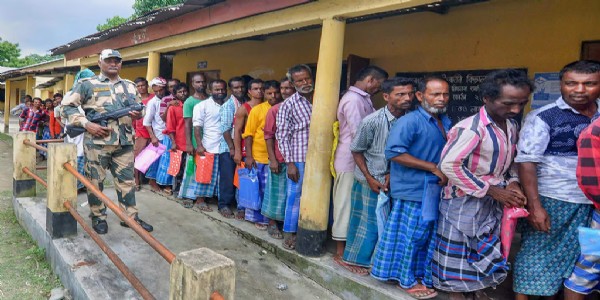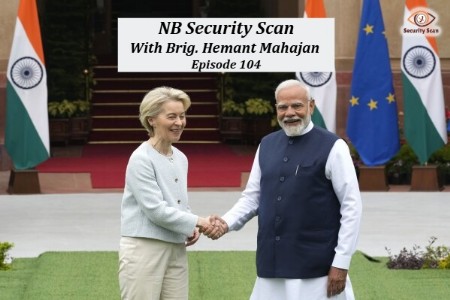#SecurityScan 37: First naval batch of Agniveers, Doklam dispute & more
Drives are conducted on a regular basis to seize illicit contraband, but the seizures are limited as illicit drugs, which originate from Manipur, are seized in neighbouring states such as Nagaland, Assam and Meghalaya. All security agencies have been empowered under the NDPS Act to seize illicit drugs and make arrests.
Total Views | 309
This article is a summary of important events that have taken place in last one week affecting, India's national security.
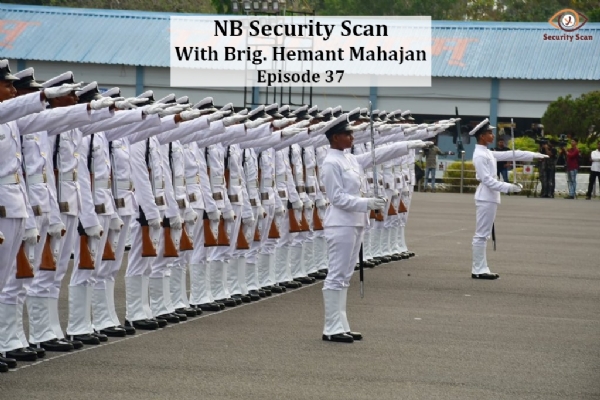
News In Brief
2 Pakistanis Arrested In Greece For Plotting Terrorist Attack At Jewish Restaurant
The Greek police anti-terrorist division and the country's intelligence services dismantled a terrorist network. According to Greek police, the terrorist network was planning attacks in Greece and aimed "to cause the loss of life of innocent citizens but also to undermine the sense of security in the country," as per The Wall Street Journal report.
How To Sink A Chinese Warship? Japan Plans ‘Triple Attack’ On PLAN Vessels
Japan’s new missile projects announced last year to deter Chinese and North Korean attacks might work in tandem, along with US and Norwegian-made missile systems to primarily target People’s Liberation Army Navy (PLAN) warships.
Biden to Stunt Growth in China for Chipmakers Getting US Funds
Commerce unveils new curbs on firms that take federal money. The Biden administration is set to unveil tight restrictions on new operations in China by semiconductor manufacturers that get federal funds to build in the US.
The $50 billion CHIPS and Science Act will bar firms that win grants from expanding output by 5% for advanced chips and 10% for older technology, according to officials at the Commerce Department, which will disburse the funds.
Beijing envoy warns Dutch of retaliation for chip curbs:
Tan Jian, Chinese ambassador to the Netherlands, says export restrictions on chip technology ‘will not be without consequences’.The Dutch firm ASML is the world’s leading producer of photolithography machines crucial to making advanced microchips.
TikTok Generation: A CCP Spy in Every Pocket
Every day that TikTok is allowed to operate in the United States is another day that China can collect data on American citizens and sharpen its ability to exploit them—especially young people. The more that TikTok becomes embedded in U.S. society, the harder it will be to uproot. Even so, there will be another TikTok. The U.S. will have ceded yet another critical digital battlespace to its adversaries. More so, U.S. policymakers have a duty to safeguard America’s social fabric and protect young citizens from the whims of a hostile, foreign nation.
TikTok’s data exploitation practices, privacy abuses, influence operations, and promotion of social contagions leave Americans vulnerable to the CCP.
Given the current threat environment, a wholesale ban of TikTok’s operations in the U.S. is the only viable option to protect the United States and Americans.
Securing The Undersea Cable Network
Over 95 percent of international telecommunications flow via a fiber-optic undersea cable network that is increasingly vulnerable to both physical (mostly submarine-based) and cyberspace-based attacks.
The mitigating measures considered range from the purely technological to the diplomatic.
Internal Security
Manipur fighting uphill battle against drugs
From 2018 till March 3 this year, 217 people have been convicted in 636 cases. But those convicted are couriers; no kingpins have been convicted due to shoddy investigation. The conviction rate is poor, with many officials authorised to seize drugs and make arrests under the NDPS Act not being very familiar with the processes involved in seizures. The public and the Centre should support the state government to win the war against drugs.
Manipur, which shares a 398-km border with Myanmar, is combating the menace of illicit drugs on two fronts — cultivation of poppy and ganja and conversion of opium into heroin, and smuggling of drugs from Myanmar.
The problem of hard drugs is now so serious that people are no longer bothered about soft drugs like ganja.Opium and ganja are mainly produced within the state, while heroin is either manufactured locally or brought from across the border. The rest all are smuggled from across the border. As the border is is loosely guarded, it is easy to cross it. Drives are conducted on a regular basis to seize illicit contraband, but the seizures are limited as illicit drugs, which originate from Manipur, are seized in neighbouring states such as Nagaland, Assam and Meghalaya. All security agencies have been empowered under the NDPS Act to seize illicit drugs and make arrests.
Less than 10 per cent of the Manipur-Myanmar border is fenced and thus it serves as the transit route for illegal drugs to the North-East from Golden Triangle, the tri-junction of Myanmar, Laos and Thailand borders.
Manipur DGP P. Doungel, at a press conference in January, said from January 1, 2017, till January 17, 2023, his department had arrested 2,817 people and 2,243 cases had been registered under the NDPS Act. He added that during this period, poppy plantation on 15,642 acres was destroyed, including 777 acres this year. He said the state’s ‘War on drugs 2.0’ was a serious effort to destroy poppy cultivation.
Manipur is facing a serious drug issue — both its use and trafficking and transportation to other states and countries. The state government needs to ensure that kingpins are convicted.
The public and the Centre should support the state government to win the war against drugs. Else, Manipur will become the gateway of illicit drugs to other parts of the country.
Union Home Minister Amit Shah lauds contribution of CRPF
Noting the role of the National Investigation Agency (NIA) and the Enforcement Directorate (ED), HM said the two agencies have been acting strongly to stop funding to LWE. Shah said, the CRPF's annual celebration is being held for the first time in a LWE-affected area and that too in Bastar district of Chhattisgarh. The event was held at Karanpur camp of the 201st battalion of the Commando Battalion for Resolute Action(CoBRA), which is located around 20 km away from Jagdalpur, the headquarter of Bastar district.
External Security
Bhutanese Prime Minister- China has an equal say in resolving the Doklam dispute
BHUTANESE Prime Minister Lotay Tshering’s assertion that China has an equal say in resolving the Doklam plateau dispute has compounded India’s worries. The plateau, which lies at the tri-junction of India, China and Bhutan, is a ground of immense strategic significance. Doklam had witnessed a tense standoff between Indian and Chinese soldiers in 2017 after Beijing tried to extend an illegally constructed road towards Mount Gipmochi and the adjoining Jampheri ridge. China’s intention was to gain access to Jampheri and thus get a clear line of sight to the sensitive Siliguri corridor or Chicken Neck that connects the northeastern states with the rest of India. However, the Indian Army scuttled the Chinese nefarious plan.
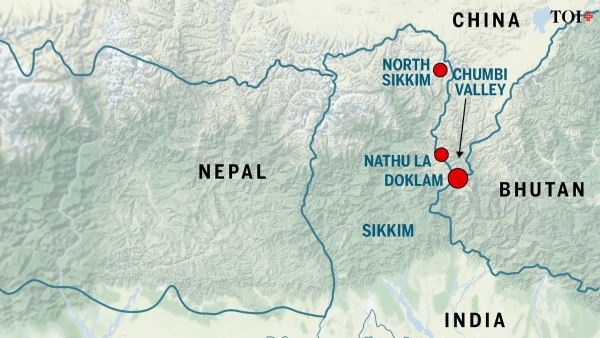
Tshering’s statement, which runs contrary to his 2019 stand that the ‘existing tri-junction point should not be disturbed unilaterally’, indicates that China is intensifying pressure on Bhutan to resolve their border dispute to Beijing’s satisfaction. In January, China and Bhutan had agreed to expedite negotiations to settle their boundary issues. In recent years, China has also stepped up efforts to establish formal diplomatic relations with Bhutan. Wooing Bhutan is part of Chines strategy to wrest the initiative from India, militarily as well as diplomatically. There are apprehensions that Bhutan might cede a portion of its territory to China.
Tshering is in denial over reports that the Chinese are building villages on Bhutanese territory. He has claimed, rather unconvincingly, that there have been no intrusions by China. It’s obvious that he doesn’t want to annoy China, notwithstanding the implications his stance can have for India-Bhutan ties. How to counter Chinese in Bhutan?
China Russia relations and Indian national interests
There have been concerns about the impact of the growing Sino-Russia cooperation on Russia’s relations with India. Russia has for long been India’s largest supplier of modern weapons systems and has been helpful in India’s production of nuclear submarines. India is also manufacturing Russian-designed BrahMos missiles, which it has provided to friendly countries, with prospects of more buyers. Moreover, purchases of petroleum products at very reasonable prices from Russia have been helpful in managing India’s balance of payments.
Russia, in turn, evidently understands that India’s defence cooperation with the US, together with its security links in groupings like Quad and I2U2 across the Indo-Pacific, are set to grow. While Russia is furious with Pakistan for supplying weapons to Ukraine, China would make every effort to get Moscow to assist Pakistan.
Strategic autonomy, meanwhile, has been, and should remain, the hallmark of India’s defence and foreign policies.
SCO-NSA meet: Ajit Doval's firm message to Pak & China on terrorism, territorial integrity
Addressing the 18th SCO meeting of NSAs here, "Terrorism in all its forms and manifestations and its financing are amongst the most serious threats to international peace and security. Any act of terrorism, regardless of its motivation, is unjustifiable". He said this in the presence of representatives from both Pakistan and China, who attended the event virtually. The meeting was being chaired by India.
The Shanghai Cooperation Organization (SCO) is an intergovernmental organization established in 2001 and it comprises eight member states, namely, India, China, Kazakhstan, Kyrgyzstan, Pakistan, Russia, Tajikistan and Uzbekistan.
Doval and Patrushev held a one-on-one meeting following delegation level meeting signifying the importance of the strategic partnership.
While India is celebrating its G20 rotational presidency in a high-voltage fashion and as a national endeavour, the rotational presidency of the Shanghai Cooperation Organisation (SCO), which it also currently holds, is being treated in a low-key manner. One obvious reason for this vast difference in approaches lies in the significance of the two groupings: the G20 is currently the world’s premier multilateral grouping, while the SCO’s international footprint is limited. Besides, there is no doubt that China is the main SCO country and Pakistan is also its member. India’s ties with both countries are passing through a very difficult phase. This, too, has led to the lack of enthusiasm about the SCO presidency.
India's Defence Ministry Signs 10 Contracts Worth Rs 5,498 With Bharat Electronics
Another contract for Akash Missile System was signed for the maintenance of two squadrons. It is a medium-range surface-to-air missile (SAM) system, developed by DRDO and manufactured by Bharat Electronics. The Akash Missile system can target aircraft upto 30 km away and has the capabilities to neutralise aerial threats like fighter jets, cruise missiles and Air-to-Surface Missiles.
PM Modi to attend Combined Commanders' Conference on April 1
Prime Minister Narendra Modi will address the Combined Commanders' Conference-2023 in Madhya Pradesh. The three-day conference will take place from March 30 to April 1, focusing on national security issues like jointness and theaterisation in the armed forces. The PM will also flag off the 11th Vande Bharat express train, running from Rani Kamlapati Railway station in Bhopal to New Delhi railway station.
Info sought on Line of Actual Control sensitive: MoD in Lok Sabha
Reddy sought to know if dozens of papers have been submitted by IGPs in the recently concluded conference conducted by the Intelligence Bureau on the Chinese intrusions and its impact on security.
First batch of 'Navy's Agniveers' pass out from INS Chilka on March 28
The POP marks the successful completion of training of close to 2,600 Agniveers, including 273 women Agniveers who are undergoing training at Chilka.
How China views the recent India-China bilateral talks on LAC
While downplaying China’s role in the LAC, the Chinese discourse suggests that India intends to internationalise the issue and benefit from the intensified China-US rivalry
Under such circumstances, what should be China’s preferred course of action? Chinese scholars seem to be of the opinion that, firstly, it must follow the policy of releasing goodwill, then sending the military. Thus China, must first strive to normalise ties with India through the release of basic courtesies or goodwill gestures (like supporting India’s G20 /SCO presidency etc.), of course, avoiding making any genuine concession on the border issue or other important issues of Indian concern. However, it must simultaneously strengthen military construction on the western border, and prepare to support a two-front struggle, lest its “goodwill gestures” fail to break any ice with India.
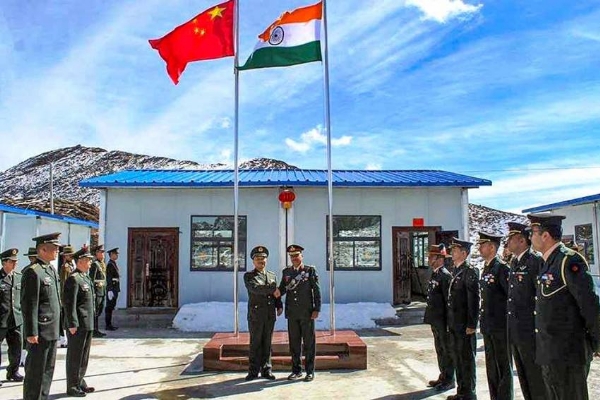
Secondly, China must strive to delay or limit the upgradation of and investment in Indian industrial chain, because more the West invests in India, India’s ego will get further inflated and stronger will be India’s position on the border issue. Thirdly, China must make good use of Russia, which has “turned completely” to China due to the Ukraine crisis. It must reach a consensus with Russia on the Sino-Indian border issue, make Russia oppose external forces intervening in the Sino-Indian border issue and thereby play an important role in reducing the geopolitical pressure on China in the Southwest direction and free up its hands to better deal with eventualities in the Southeast.
Environmental Security
Global Warming-Shrinking glaciers
The report of the parliamentary standing committee on water resources, tabled in Parliament on Wednesday, has rightly emphasised that a dedicated Mountain Hazard and Research Institute be set up to oversee and coordinate the work done by various organisations in the multi-dimensional field of global warming-induced glacial melting in the Himalayas. This is necessary as the government, surprisingly, lacks reliable data on the loss of glacial volume or warming since 1950 or the loss projected by 2100 because none of its organisations, including the GSI, ISRO and GST, have conducted specific studies on the subject. The data is crucial for anticipating and mitigating potential cataclysmic changes that make the region flood-prone. For, any change in the glacial melt impacts the hydrological cycles of major rivers like the Indus, Brahmaputra and Ganga and the areas they serve, including the hills and plains.
Last February, Parliament was informed by the Ministry of Earth Sciences, on the basis of a study, that Himalayan glaciers had lost ice 10 times more quickly over the last few decades than the average. Significantly, an array of studies monitored by various government institutes of India have also reported an accelerated heterogeneous mass loss in the glaciers. Glacial melting leads to the formation of glacial lakes, which can accelerate flash floods, impacting hydel projects and agro practices. A well-coordinated government study looking into various dimensions rather than isolated works done so far would put things in a better perspective, leading to a holistic approach to addressing the hydro-geological hazards.
Still fresh in memory are the devastating floods of Chamoli in 2021.As tackling global warming remains a challenging task, the urgency of mitigating glacial melting cannot be over emphasised.
Oil, Energy Security-
Ensuring stability in energy supplies vital
In the case of volatile oil markets, India needs to keep a close watch on developments such as decisions being taken by oil cartel Organisation of the Petroleum Exporting Countries (OPEC). This dominating group has joined hands with Russia and other allies to form OPEC+ but continues to restrict oil supplies by fixing production quotas. Russia may be the outlier in the system and is now offering discounted rates.
For a change, the impact on India is not adverse. The oil markets are reflecting concerns over the banking crisis by pushing prices downwards. So, after a year of high rates, the benchmark Brent crude is now ruling at $75-78 per barrel. This is roughly the same level as before the Ukraine conflict broke out last February. It is good news for India that has had to cope with a rising import bill for the 2022-23.
What is even more encouraging is that predictions for 2023-24 are now moderating from earlier forecasts of $100 per barrel. While this is still not comfortable for a country that imports 85 per cent of its crude oil needs, it indicates that a softening trend is expected to continue for the rest of the year.
No one would have anticipated a event like the Ukraine war to occur and reverberate in oil markets to such an extent that prices would touch $139 per barrel. Neither would oil industry experts have expected a zero-Covid policy in China to reduce global demand to such an extent that prices begin to slide from October last year.
The burden on India would have been even higher but for the availability of Russian crude oil at discounted rates. When supplies began to be sourced from that country, it was offering crude oil at rates $16 cheaper than the then average price of $110 per barrel. The discounts continued since then, ranging from $8 to $12 per barrel. Rough estimates are that the country has saved over $3 billion by buying Russian oil rather than relying on traditional suppliers in West Asia.
This policy decision was taken despite pressure from western countries to join the ban being sought on buying Russian oil supplied via the sea route.
Countering Chinese Multi domain War
Arming Vietnam:
Vietnam faces a serious long-term security challenge from China’s growing assertiveness in the South China Sea, and its response has included efforts to strengthen its military capability, particularly in the maritime sphere. It aims to diversify Vietnam’s procurement for its armed forces and coastguard, while also developing its national defence industry.
ASEAN Maritime Outlook: An Idea Whose Time Has Come?
In November 2022, Indonesia’s foreign minister, Retno Marsudi, raised the prospect of an ASEAN Maritime Outlook (AMO) in a speech at the 25th meeting of the ASEAN Political and Security Council (APSC) in Phnom Penh, Cambodia. Since then, few details of what the AMO would entail have been revealed. However, the AMO would not only focus on maritime security, which suggests that its scope would be significantly broad ranging.
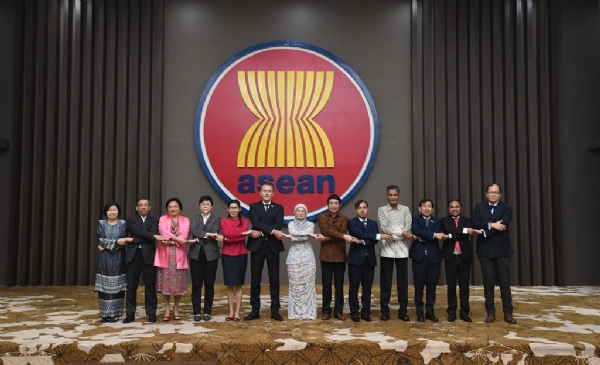
AMO will most likely be a stock take exercise to review ASEAN’s existing maritime-related mechanisms. While it may not be the grand policy or strategy document that critics from within and outside ASEAN had called for, the AMO will still be an important and much-needed endeavour for ASEAN. The last time a review was done on the status of existing ASEAN and ASEAN-led maritime mechanisms and initiatives was in 2008.
By clearly outlining ASEAN’s maritime priorities, the common maritime agendas will become more apparent. Furthermore, the Indo-Pacific has seen the advent of mini lateral groupings that seek to advocate maritime issues, the QUAD – involving the United States, Japan, India, and Australia – being one of them.
How would ASEAN Maritime Outlook help in protecting its maritime interests? In summary, the ASEAN Maritime Outlook could provide a framework for ASEAN member states and India to cooperate on maritime issues, promote a rules-based order, address common challenges, and foster dialogue and confidence-building measures. This could help to protect Indian maritime interests in the Indo-Pacific and contribute to a more stable and predictable regional environment.
Australia’s Security in China’s Shadow
As Australia awaits the outcome of a Defence Strategic Review ordered by Prime Minister Anthony Albanese’s new Labor government, and digests the parallel announcement of a pathway towards acquiring nuclear-powered submarines under the Australia–United Kingdom–United States (AUKUS) strategic technology agreement. Australia serves as an example for other countries facing a similar set of challenges.
The demands of AUKUS-Australian Think Tank
AUKUS will require a major uplift not simply in the navy, but across the defence organisation and government—including in strategic analysis, program design and delivery, technical competence, and disciplines that are hard to find in Australia such as statecraft, complex project management and technical product management.
Much of the means of AUKUS needs to be in civilian organisations. It’s not simply strategic expertise that’s of concern, but a need for discipline in program governance and improved civilian capability.
Despite the vociferous coverage, AUKUS remains under debated—because its realisation will demand a revolution in much of our society and economy.
Beijing’s Subversive Political Warfare in the Pacific—and the Need for Greater Engagement by the United States and India
China is extensively employing political warfare to subvert island states and undermine defense architecture in the Pacific. The United States and its allies should build responsible and effective partnerships with Pacific states, and present them with a better option than the corrosive engagement offered by Beijing. What should be this strategy?
Overall, countering China's political warfare in the Pacific requires a sustained and comprehensive effort that addresses economic, political, and social factors. By working with Pacific states to build responsible and effective partnerships, the United States and its allies can offer a compelling alternative to China's corrosive engagement.
Russia Ukraine War
The Pentagon plans to send older, refurbished Abrams tanks to Ukraine far sooner than expected
Excess M1A1 tank “hulls” are to be refitted and refurbished to make them ready on a quicker timeline for Ukraine than new tanks could be delivered.
As War in Ukraine grinds on, China Helps Refill Russian Drone Supplies.
China has shipped more than $12 million in drones to Russia since it invaded Ukraine, in an indication of quiet collaboration.
--
Bharati Web




